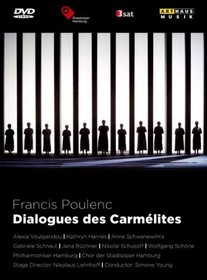| Actors: Poulenc, Young, Schone, Voulgaridou, Lehnhoff Genres: Indie & Art House, Musicals & Performing Arts Sub-Genres: Indie & Art House, Musicals & Performing Arts Studio: Arthaus Musik Format: DVD - Color DVD Release Date: 05/25/2010 Theatrical Release Date: 00/00/2008 Release Year: 2010 Run Time: 2hr 46min Screens: Color Number of Discs: 1 SwapaDVD Credits: 1 Total Copies: 0 Members Wishing: 1 Edition: Classical MPAA Rating: NR (Not Rated) Languages: French Subtitles: English, German, French, Spanish, Italian, Japanese |
Search - Dialogues Des Carmelites on DVD
  | Dialogues Des Carmelites Actors: Poulenc, Young, Schone, Voulgaridou, Lehnhoff Genres: Indie & Art House, Musicals & Performing Arts NR 2010 2hr 46min |
Larger Image |
Movie Details
We're sorry, our database doesn't have DVD description information for this item. Click here to check Amazon's database -- you can return to this page by closing the new browser tab/window if you want to obtain the DVD from SwapaDVD.
Click here to submit a DVD description for approval.
|
Movie ReviewsAn Excellent Dialogue David D. Dollinger | Pasadena, CA | 06/10/2010 (4 out of 5 stars) "The newest taping of Poulenc's Dialogue of the Carmelites brings the total of DVD's to four: surely a record for an opera composed after WWII, though truth to tell it is essentially written in a conservative and accessible idiom, Poulenc's; thus considering that it was written years after Wozzeck and Lulu, it doesn't challenge the listener as the aforementiond works do, but rather engages the receptive auditor in a very personal and beautiful work.
My first Dialogue emanated from Strasbourg and has the virtue of a number of francophone artists, a real plus in French opera. Additionally all the singers are truly engaged under Keller's direction. The voices are steady, not a wobble to be heard; this is more unusual these days than you would think. My second was the Scala production under Muti. The cast is mostly German and American. Small roles were undertaken by native singers. The production boasts of Anja Sila as the Old Prioress who has only two scenes, the interview with Blanche and her death bed scene. Silja at this time had a voccal range of about four notes, top notes are not pitched and the low notes are mostly growled. The role, however, provides a singing actor with great opportunitites. Yet one only has to hear Nadine Denize (Strasbourg) and Harries (Hamburg)to realize that Poulenc did write a musical line and when followed the scene is infirnitely more more moving, both dramatically and musically. The newest entry is from Hamburg. The cast is most German with the exception of Kathryn Harries who is from the UK. Blanche is sung by Alexia Voulgaridou; I would assume that she is either from Greece or possibly Roumania. Even though there is not a francophone artist involved, the text is treated far better than the Scala set. For many this will not be a factor and even though Poulenc was alleged to have said that he wanted the work performed in the vernacular of the country it was performed; only the Australian set is sung in English. The Met for the most part has performed in it in English although if memory serves me correctly there was a Saturday broadcast that was in French. The newest set can be highly recommended with only one caveat. Gabriele Schnaut as Mere Marie. Thank God the role is (relatively) small. I have found it appalling that this singer has had engagements that are all out of proportion to the contribution she makes. I find the voice ugly: there is no onther word. She was a wretched Ortrud in a staging of Lohengrin from Bayreuth. There is also a Turandot. A wobble intrudes whenever she opens her mouth. It is truly unfortunate, but this should not be a deal breaker even though she is trumped in the two other sets mentioned above. The remainder of the cast provides distinguished performances of great beauty. The surprise casting is Anne Schwanenwilms as Mme. Lidoine, a strong artist who dominates the last act. She dominates because Poulenc wrote it that way, not because Schvananwilms is making a "star turn". The direction is by Nikolaus Lehnhoff; for reasons known only to Herr Lehnhoff he has chosen to update the setting to pressent time. In an opera in which the main protagonists are nuns, this more couldn't be more absurd and while many orders have moved away from the conventional habit, the visual image that most people have of Carmelite nuns is not an "updated" one in view of their vows of silence and continual prayer and indeed, these nuns have not chosen to adopt a more twentieth century habit. Aside from this one idiosyncracy the settings are minimalist, a path chosen by the Strasbourg and Scala productions and doubtless the Australian." |
